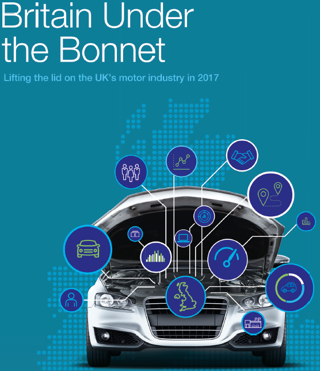Brexit fears are playing a key part in increasing dealer pessimism with most believing profits will drop or remain flat this year.
Profitability is also under pressure from issues of consumer confidence, potential changes in purchasing habits resulting from concerns around possible diesel scrappage, the recent media and FCA attention on potential personal contract purchase (PCP) mis-selling and the likelihood of continued reductions in retail registration numbers.
The findings come in the second annual MHA Motor Dealer report revealing a significant drop in optimism amongst UK motor dealers around the prospects for profitability in the sector this year: 76% of dealers surveyed said they expected profits to drop or remain static for the year.
This is an increase of 20% from 2016.
The MHA Motor Dealer report, compiled by the UK-wide group of accountancy and business advisory firms, looks at the current outlook of the sector as well as future trends including online retail, alternative fuel and autonomous vehicles and the outlook for M&A across the UK.
Head of the MHA motor sector Steve Freeman said: “I am not surprised to see the survey results confirming the marked change in dealer confidence levels we have heard from our clients recently.
“The industry is really going through a period of change and I do think that online developments may start moving at a pace now.
“The continued strength and resilience of the sector is certainly dependent on all parties (including manufacturers and their franchise partners) working together to ensure a sustainable business model for the future.”
The pessimistic outlook for 2017 is driven by the ongoing uncertainty around Brexit with 76% of dealers believing it will have an adverse impact on the sector over the next 12 months.
The impact of increasing costs on profitability in areas such as staff recruitment and retention, compliance and regulation, charges, rates and utilities continue to cause concerns.
Pre-registration levels were cited as having the main adverse pressure on dealer performance.
Despite this reduced optimism, dealers are expecting to drive their performance predominantly through used car sales this year.
Growth plans in the businesses themselves remained relatively steady with 60% of dealers saying they planned to grow over the next 12 months compared to 64% in 2016.
However, there was a significant shift in how that growth was going to be achieved.
Only 13% of those surveyed said growth would come from acquisition compared to 40% in 2016.
Organic growth and redevelopment is now the main focus with 62% of dealers compared to 44% in 2016.
A quarter of dealers said their growth is expected to come from expanding the number of locations, an increase of 9% from last year.
The survey results also reflect the fact that mergers and acquisition activity slowed during the back end of 2016 and beginning of 2017, with only 7% of dealers looking to exit their business and only 8% looking to acquire.
Online retailing
Future trends in new vehicle purchasing were dominated by the growth potential from online retailing. 94% of dealers cited online as becoming an integral part of the new car purchasing model in the future.
63% of those dealers believe it will happen within the next five years.
However, there remain key areas to address including clarity around where responsibility for selling vehicles will lie and the infrastructures required to hand them over.
Alternative fuel vehicles (AFVs) are set to gain a significant market share within the next five to 10 years.
59% of all respondents said they were either very happy or happy with their franchise partners’ strategy for future proofing AFVs and autonomous vehicles.
For premium brands the level of confidence was much higher than volume brands (74% and 54% respectively).
The dealer view
Trevor Reeve
Chairman, Pentagon
"I am still positive about the group’s 2017 outlook performance. We had a great Q1, even after a year on year decline in fleet volumes and some issues with new car availability.
"Q2 has been much tougher, and we are currently reviewing our long term partner strategy, as some manufacturers have undoubtedly been pushing unsustainable volume pressures into their dealer network this year.
"The main business risk areas that the management team are currently working on are in relation to the FCA, GDPR, consumer law and employment regulations. Whilst we are not adopting a specific acquisition strategy for 2017, we are always on the lookout for opportunities that fit the group and have turnaround potential.
"We currently aren’t seeing any adverse impact to our current business model from on-line retail or the increasing availability of on-line motor finance, but are fully aware of a shift in customers being users rather than owners and the increasing requirement from customers for flexibility and instant communication.
"However, I still believe overall that high levels of customer satisfaction and delivering a great service are and will continue to be the key drivers for a good business."
The manufacturer view
Paul Flanagan
Managing director, UK and Europe North, Group Renault and former Ford France president
"This survey clearly shows franchises are expecting a near term profit slowdown, just at a time when the industry is poised for significant change and some manufacturers are likely to call for new investment.
"The relationship between franchises and manufacturers needs to stay as open and transparent as possible from both sides.
"Many great initiatives have taken place over the last year, I would highlight Lookers inviting manufacturer heads to their annual management conference, a great way to ensure strategies stay aligned.
"Most manufacturers pay serious attention to the NFDA survey as a barometer regarding their relationship with their network, so it essential that the network takes that opportunity for honest feedback.
"Whilst the future of the car dealership is currently being questioned, given the nature of the product,
"I believe there will always be a need for a physical presence. This is likely to be in the form of mobility centres, but whilst manufacturers are busily studying how to generate future revenue streams; it is equally important that the franchise network also participates in these studies to ensure their future survival.
"One long standing franchise issue is recruitment and retention, this has to be finally addressed, as it will help provide the necessary diversity to address the future.
"The welcome introduction of product geniuses into the industry will not only help with recruitment (apprentices just aren’t seen by some as appealing enough); they will also provide the right generational skills to protect you from the rapidly changing social landscape.
"Social media is a distinct opportunity to address many of today’s issues.
"One great example is the recent LinkedIn usage of Trust Ford staff.
"In the build up to and post their annual awards ceremony, many of their staff were enthusiastically using LinkedIn to show their pride and joy of working for the group.
"This can only assist the group perception on a recruitment portal.
"Network profitably relies on small percentages and ensuring every opportunity is taken."
Asked for her view on the findings, Sue Robinson, National Franchised Dealers Association director, said: “We have entered challenging times.
“But our sector is resilient and used to coping with difficult and unexpected situations.
“It is encouraging to see that the majority of dealers feel positive about their partners’ strategy for AFVs.
“We are also pleased to see that there is a very high level of awareness of the importance of online retailing.
“These two elements are likely to become two predominant aspects of car retailing in the near future and franchised dealers’ flexibility and ability to adapt will help them continue to operate confidently and successfully.”
MHA Motor Dealer report key findings
Respondents expecting profitability to increase:
2017: 24%
2016: 44%
Respondents expecting a reduction in profit
2017: 40%
2016: 32%
- 32% of premium brands are expecting profitability to increase
- 18% of volume brands are expecting profitability to increase
- 76% think Brexit will have some adverse impact on the sector over the next year
- 62% think their manufacturers’ new car sales targets for 2017 are achievable. In 2016 the figure was 53%.
Used car performance was ranked as the most positive factor in terms of its impact on 2017 profitability
Pre-registration levels, followed closely by consumer confidence and cost savings, were ranked as the factors which would have the most adverse impact on 2017 profitability.
33% of premium brand franchise holders are expecting to spend at least £10 million on maintaining corporate identity standards.
75% of volume brand franchise holders expecting to spend less than £250,000.
Two thirds of manufacturers stated that network sizes will reduce by 20% during the next year.
Business growth
2017: 60% expect to grow in the next 12 months
2016: 64%
- 13% through acquisition (2016: 40%)
- 25% are looking to increase sites
- 62% are looking for organic growth or redevelopment
> For a copy of the MHA report email Hannah Farmborough or call on 0207 429 4147.
















Login to comment
Comments
No comments have been made yet.